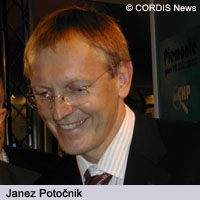Janez Potocnik outlines EU research opportunities for Malta
In an article for the Sunday Times of Malta, the European Commissioner for Science and Research, Janez Potocnik, has urged the country to seize the opportunities for cooperation offered by the EU and EU research projects. Using the mighty pen he spoke directly to the government, private enterprises and scientists of Malta on the concrete benefits that their country could enjoy by being part of the EU. He referred to the cooperation opportunities of the European Technology Platforms (ETPs) and the new Seventh Framework Programme (FP7). The Commissioner began his article by calling on the government to honour its commitment to raise R&D spending from 0.29 to 0.75 per cent of GDP by 2010, so as to create the favourable conditions that then encourage greater private sector investment. He said: 'public spending is extremely important - it can have a leverage effect on private spending, address market failure, and ensure that R&D is aligned with political priorities such as alternative energy sources, better provision of health services or developing entrepreneurship'. Identifying the factors important for companies when making R&D investment decisions was another area where Malta could gain from working with its EU partners, according to the Commissioner. Other Member States' knowledge and experience could then be adapted to fit Malta. Regarding innovation in products and services, Mr Potocnik recognised the paramount importance of private sector investment and so encouraged Maltese companies to view R&D investments as investments in their companies' future. He cited the European Technology Platforms (ETPs) as an example of a real driver of innovation, where a whole sector is brought together to establish a vision of where it would like to go. They also allow companies, universities, research institutes, financial organisations and consumers to identify the research needed to get there. The success of the European mobile communications industry was held up as a case in point. As for FP7, the Commissioner highlighted possibilities for the involvement of companies in research projects and how the programme would particularly look into increasing the participation of small and medium sized enterprises (SMEs) in cooperative projects. He said: 'I see great potential for Maltese companies to take advantage of both these aspects of the programme - because for a small country like Malta, European cooperation is vital. It can give Maltese scientists and companies access to facilities and infrastructure that are just not viable at national level.' Mobility was held up as another advantage of EU membership. Almost ¿5 billion will be available under the mobility section of the programme to support researchers wishing to carry out their research in another Member State, or for university researchers interested in spending time working in industry. The European Commissioner concluded by saying that 'by engaging with European partners, Maltese companies, your university and your people will benefit directly. I very much hope that Malta will seize the opportunities offered by the new European programme, and get involved.'
Countries
Malta



